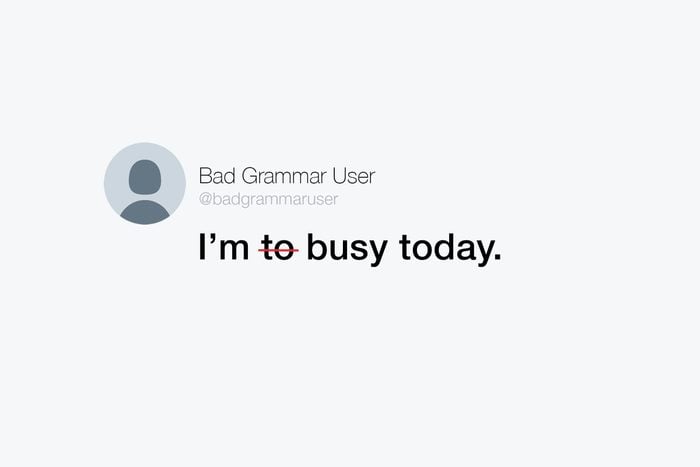
Two, to, and too
It’s a classic mistake, think: I went to the bar with two of my friends, then they wanted tacos, too. The real origin of this error, which can instantly make you seem a bit less than educated online, is an unclear understanding of the ways to use the double “o” in “too.” It can mean “also,” as in the example in the first sentence, or it can mean “very/excessively,” as in “there are too many confusing words in this language.” That’s no joke—here are 20 more of the most confusing grammar rules in the English language.
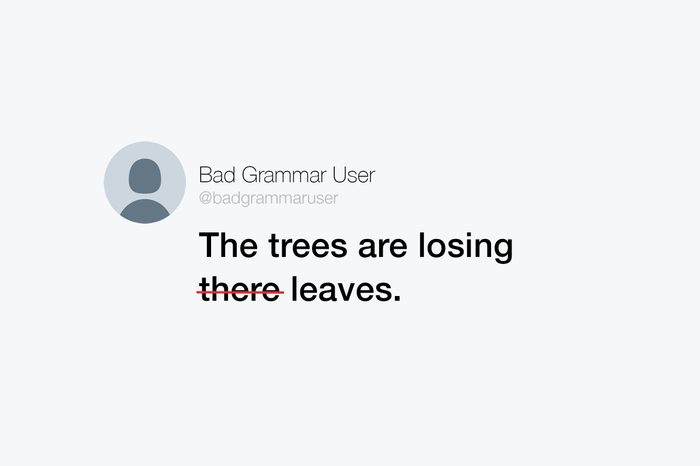
Their, they’re, there
To eliminate confusion, remember to only use the apostrophe when it’s a contraction (combining the two words “they” and “are” into “they’re”), advises Kathryn Petras, co-author of The New York Times’ bestseller You’re Saying It Wrong. Another easy trick is the secret “i” in “their” can be a way to remember ownership (as in “I own that,”) to signify possession, even though “their” is for other people’s possession, as in “those are their books.” Sometimes bad grammar gets to be too much–here’s what happens when you block someone on social media.
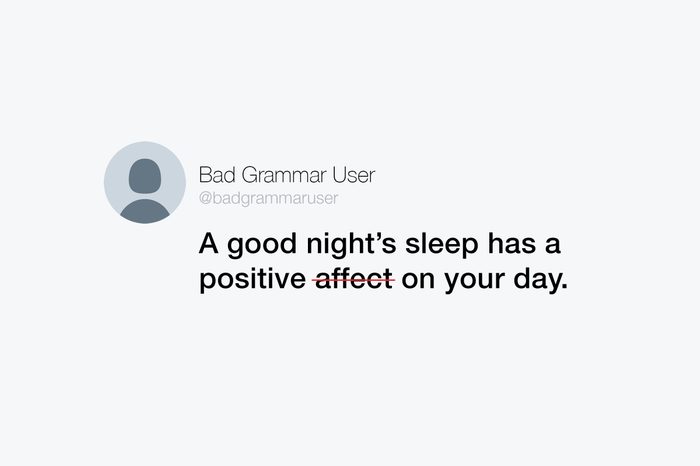
Affect vs. effect
Everyone has that word that has tripped them up since 9th grade English class, and the affect/effect dilemma is high on the list. The good news is, according to Grammarly, it’s a pretty easy fix: affect almost always acts as a verb, while effect is almost always a noun. There are exceptions of course. The numerous homophones in English (words that sound the same) have always made the language notoriously hard to learn, but native speakers struggle just the same. If you really struggle, these online grammar check programs are made for you. These grammar rules have changed a lot in the last decade. but that doesn’t “affect” this rule.
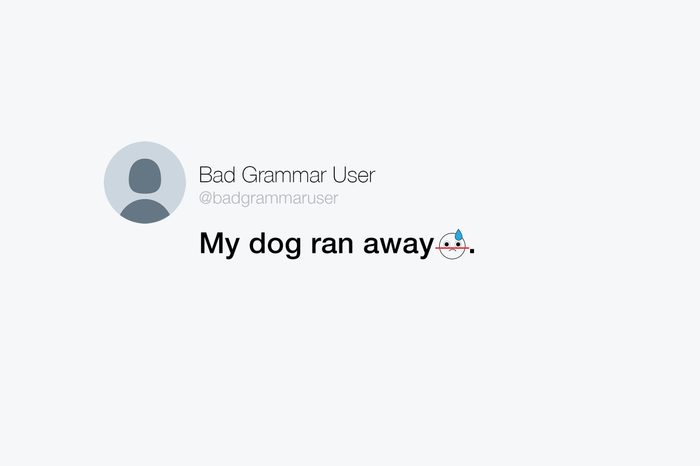
The right tear-filled emoji
It’s not just your word usage you need to be mindful of, watch out for those emojis, too, says Gretchen McCulloch, Canadian linguist and author of Because Internet: Understanding the New Rules of Language. While she is forgiving of grammar mistakes in social media, she points out that people do often use one particular emoji incorrectly quite often: the tear-filled emoji. You may be using the wrong emoji with a “tear” on it if the drop of water is above the eyes rather than below. In that case, it indicates sweat instead of a tear. Brush up on the meaning behind these 11 weirdest emojis before you send your next text.
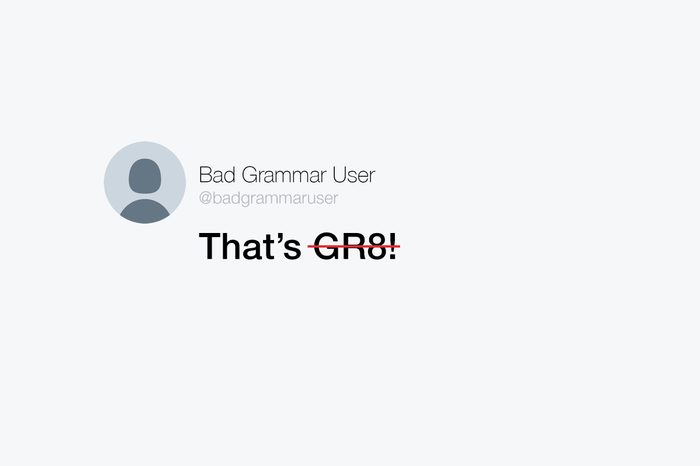
Using an outdated saying
Another potential for miscommunication happens between generations when younger people use older expressions ironically, according to McCulloch. “Things—whether that’s jeans, foods, or fads—go through this cycle of sincerity and come back as irony,” she says. “So bits of language that were once faddish, if they stick around later, they often get that sort of additional ironic interpretation because if they were so trendy for just a couple of years it’s hard to see them without the lens of that trend showing up.” We see this happening with LOL and GR8, for example, and with these 11 old insults that have turned into compliments.

Your vs. you’re
Incorrect grammar and spelling or punctuation mistakes often lead people to “take you a bit less seriously” or “assume you’re not as smart or as educated as you actually are,” Petras says. This especially goes for “your” and “you’re” as two simple incorrect keystrokes can change the entire meaning of the sentence and mix up your reader. “When it’s there in black and white, it makes more of an impression,” she said. You’ll also want to avoid these 26 words and phrases that make you sound stupid.
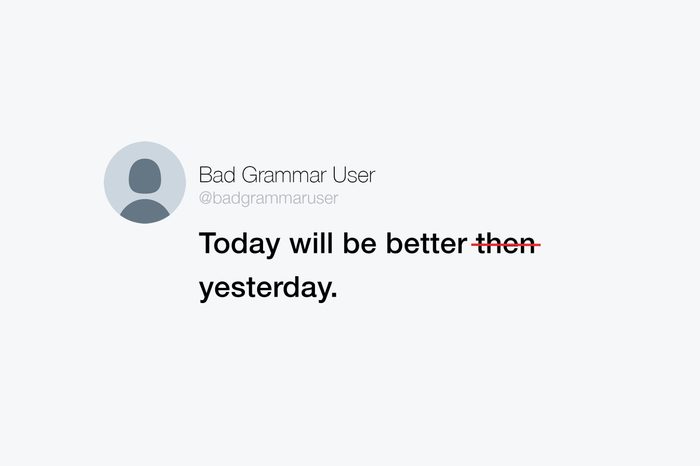
Then vs. than
You can be better “than” your own current social media grammar level, right? A refresher: “Then” is typically used for what happens next (we fixed our grammar, then our profile picture) and “than” is typically a comparison (I look smarter in my profile picture “than” in my mistake-filled posts). This is one of those rules that can be overlooked if it’s once in a while, but as Petras points out about all grammar mistakes: “if you’re a repeat offender, someone might think you’re not quite as language-aware as they are, and might internally wince or silently judge.” When writing, avoid these overused words.

Using Emojis too literally
Are we interpreting emojis the same way? McCulloch says she often hears younger people complaining about the older generation using emoji more literally than intended. “There’s a perception about people who aren’t as fluent using emoji that you can sprinkle those pictures in anywhere and that they are used very literally. For example, if you are talking about a cat you could use a cat emoji,” she says. “But people who are more fluent with emoji, tend to use emoji to influence the tone or the context or the intention of what they are communicating.”
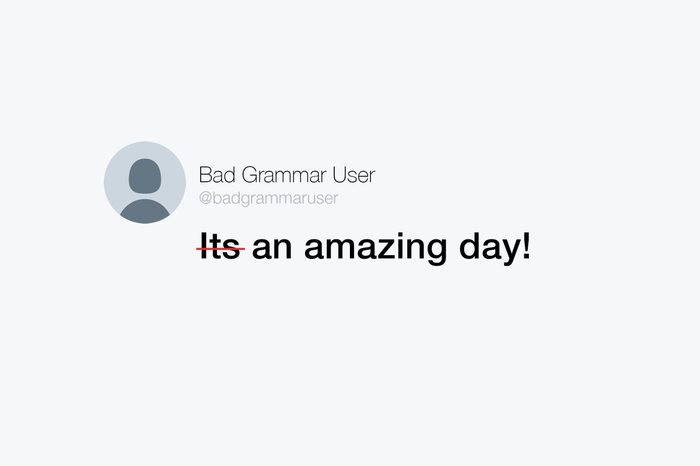
Its vs. it’s
Want to hear the easiest grammar rule you forgot from junior high? You never need an apostrophe in “its” unless you are combining it and is. That’s it! End of rule. So why do we see so many apostrophes plastered in various locations around the “t” and the “s” on a whim? Because it seems logical to put that apostrophe in to show possession (as in the mouse forgot its’ cheese), but it’s incorrect. It doesn’t help that it ends in an “s” which always complicates things. Speaking of, here’s a primer on how to pluralize words ending in S.
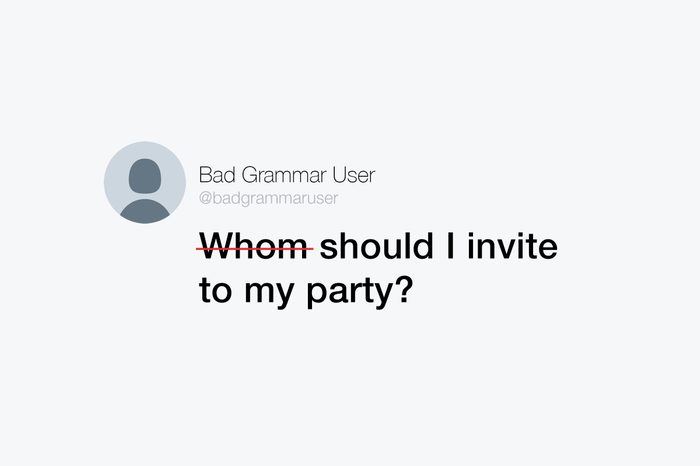
Hyper-correcting confusing concepts
There can be too much of a good thing, as indicated by social media platforms full of extra and superfluous whoms (when a “who” would have done the trick) from well-intentioned yet confused posters. Petras calls this a “case of what’s called ‘hyper-correcting.'” “People are trying so hard to sound erudite and to be correct that they’re actually doing the opposite,” she says. As a rule of thumb, on social media, don’t use a ¢10 word when a ¢5 word will do.
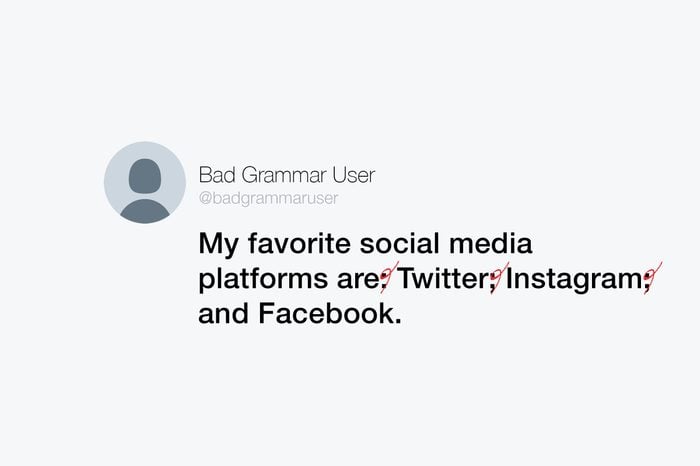
Sounding too smart: over-punctuating
You are excited about extra punctuation and ready to shake up your usual comma, period, repeat. Great! But take a second to refresh yourself on the semicolon, the colon, and the dash (“em” dash, if we are getting technical.) The semicolon connects sentences that are pretty related; they both have similar topics. The colon often introduces a list: Twitter, Instagram, and Facebook users will all thank you. The (em) dash—which can set a thought apart—can come in handy when you’ve used too many parentheses already. The trick to fancier punctuation is to use sparingly.
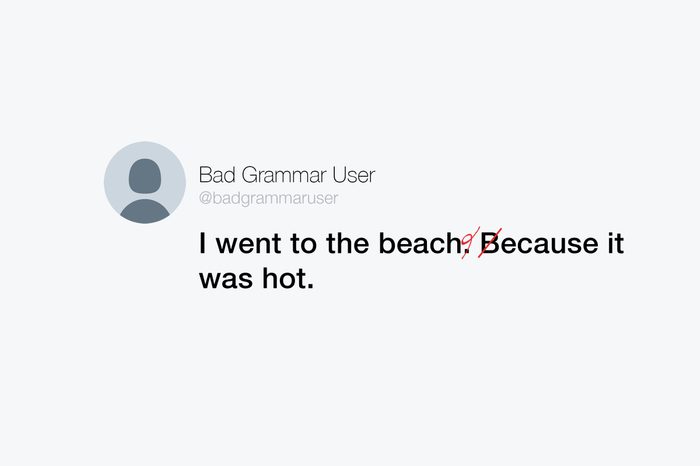
Fragments and run-ons and misplaced periods: oh my!
It’s one thing to have a casual tone, “but writing a ‘sentence’ like ‘I went to the beach. Because it was hot.’ is just plain incorrect,” Petras says. To ensure you have a full sentence when you mean to, confirm there is a subject and a predicate (verb) each time. Another easy trick is to read the sentence aloud to see if the period is placed at a natural pause, which it wouldn’t be in the example above (between beach and because).
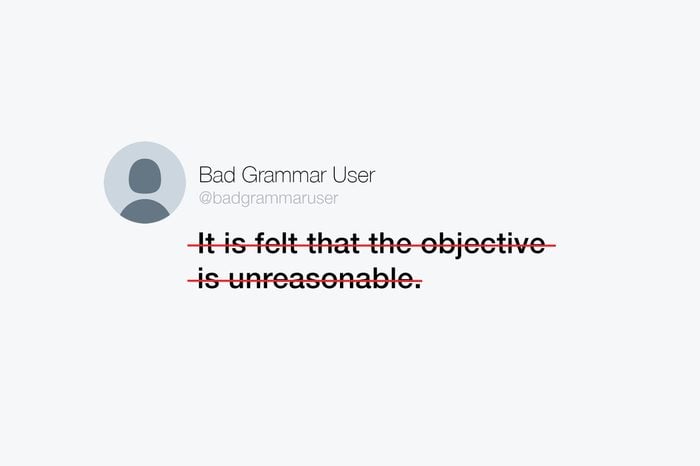
Using overly formal language
We all have that friend or family member who posts on social media as if they are composing their dissertation—fancy verbiage, long and poetic sentences, and complicated punctuation. But they may be accomplishing very little, aside from acquiring some eye rolls from scrollers. Instead, Petras encourages being casual and even using abbreviations such as “obvi” and “TMI” wherever you like. “It isn’t incorrect—it’s relaxed,” she says.
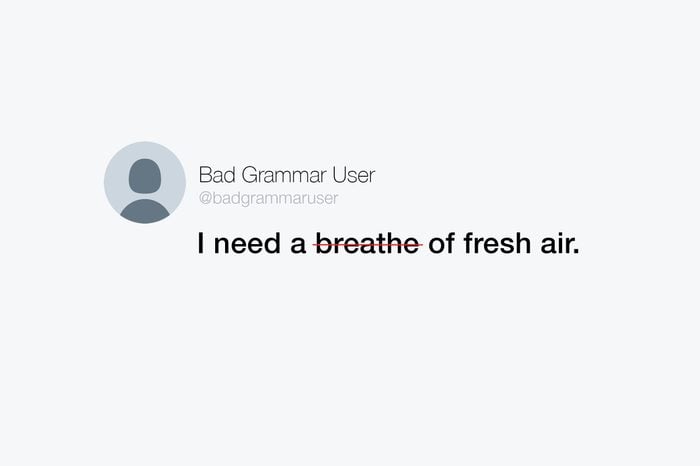
Ignoring grammar altogether
As with those college pictures of you that you should have taken down before applying for a job, posts on the internet stay with you and “out there,” sometimes for a long time. Careless errors from even decades ago can resurface along with posts you wish you hadn’t written. “And those mistakes last. Someone can click and see a mistake made weeks ago, even years ago,” Petras says. You should either delete them or correct them stat. Making spelling mistakes is, after all, one of the social media moves that could derail your career.
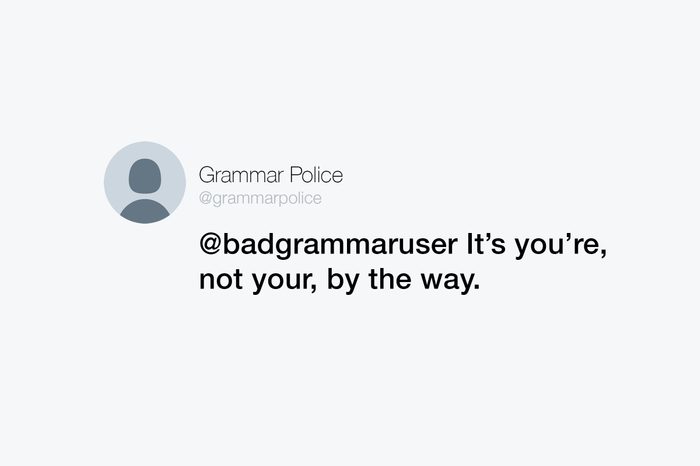
Correcting other people’s grammar in your posts
The irony of all of this is you do not want to be the person calling others out for any of the above mistakes. Both Petras and McCulloch emphasize the need for more kindness on social media, and that it only makes you look worse to be the one to criticize someone else’s grammar. Instead, McCulloch encourages us to accept a wide range of usage and to respect our differences as speakers (and writers) as well as paying attention to the content and intention. Petras discusses in her podcast You’re Saying it Wrong that “it’s one thing to be grammar-aware yourself and love the precision of English and the beauty in well-crafted writing. It’s entirely another thing to keep correcting people. You can gently hint, or work in the proper usage, word or whatever in your reply to them, but continually correcting errors is a sure way to irritate people.” Next, read on to find out what your social media posts reveal about you.
